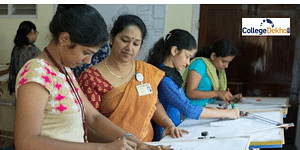B Tech Food Technology
B Tech Food Technology Overview
B Tech Food Technology is a 4-year undergraduate course that is divided into 8 semesters that studies Food Science and Food Technology. It focuses on the processing of food and its' preservation techniques. It covers food science and engineering concepts including Food Packaging, Nutrition Science, Food Manufacturing and Processing, Storage, etc. The B Tech in Food Technology syllabus focuses on the fabrication of packaging materials, preservatives, storage containers, colorants, and flavors, as well as the long-term storage of food that adheres to the requirements set by national and international governing organizations. The B Tech food technology eligibility criteria state candidates have to complete class 10+2th with at least 50% aggregate with Physics and Mathematics as mandatory subjects along with one optional from Chemistry/Biology/Biotechnology from a recognized university.
The food technology industry is expanding rapidly and it shares almost 14% of the manufacturing GDP and 13% of India’s total food exports. The selection of candidates for admission to the B Tech Food Technology course is either through direct admission or through state or national-level entrance exams such as JEE Main, KIITEE, BITSAT, WBJEE, VITEEE, TANCET, SRMJEEE, and more. Further, the average course fee for this course ranges between INR 35,000 and INR 2,00,000 depending on the type of Institute. Candidates can pursue this course via online mode or offline mode as per their preference. A few best colleges for BTech Food Technology are Jamia Hamdard University, Shri Mata Vaishno Devi University, NIFTEM Sonepat, Amity University Noida, and so on. Graduates of this course can attain positions such as Process Engineer, Food Technologist, Quality Executive, Food Technology Consultant, etc. with an average salary of INR 4,00,000 pa. After the conclusion of BTech food technology course, candidates can opt for MTech Food Technology, MTech Dairy Technology, Master of Business Administration (MBA), etc. for higher education.
Also Check -List of NIT Colleges in India 2024
Table of Contents
- B Tech Food Technology Overview
- B Tech Food Technology Course Highlights
- Why Choose a BTech Food Technology Engineering Degree?
- Types of BTech Food Technology Engineering Programs
- B Tech Food Technology Eligibility Criteria
- Entrance Exam for B Tech Food Technology
- List of Popular BTech Food Technology Engineering Specializations
- BTech Food Technology Engineering Admission Process in India
- BTech Food Technology Engineering Fees in India
- BTech Food Technology Engineering Syllabus and Subjects
- What is the Difference Between BTech Food Technology and BSc Food Technology Degrees?
- Top Government BTech Food Technology Engineering Colleges in India
- Top Private BTech Food Technology Engineering Colleges in India
- B Tech Food Technology Top Colleges in India (City Wise)
- Direct BTech Food Technology Engineering Admission Process Without Entrance Exam
- BTech Food Technology Jobs, Salary and Top Recruiters
- Courses After BTech Food Technology Engineering Degree
- FAQs about B Tech Food Technology
- B.Tech Food Technology Engineering in IITs (Comparison)
B Tech Food Technology Course Highlights
Some major highlights of the B Tech Food Technology course include the examination type, course structure, entrance exams, average starting salary, top recruiters, and top job profiles listed in the table below.
| Particular | Details |
|---|---|
| Course Name | B Tech Food Technology |
| Duration | 4 years |
| Exam Type | Semester-wise |
| Eligibility | 10+2 with at least 50% aggregate marks in PCM |
| Admission Process | Merit-Based + Entrance Exam |
| Top Entrance Exams | KIITEE, BITSAT, VITEEE, JEE Main, TANCET, SRMJEEE |
| Average B Tech Food Technology Course Fee | INR 50,000-1,00,000 per semester |
| Average B Tech Food Technology Starting Salary | INR 2,00,000 - 6,00,000 PA |
| Job Options | Food Engineer, Production Manager, Food Processing Engineer, Nutrition Specialist, Food Storage Manager, Food Executive, Analytical Science, etc. |
| Top Recruiters | Dabur India Limited, MTR Foods Limited, Hindustan Unilever Limited, Godrej Industrial Limited, Nestle India Private Limited, Britannia Industries Limited, and so on. |
.png)
Why Choose a BTech Food Technology Engineering Degree?
The food industry is growing rapidly. Over the period, people have become aware and concerned about food quality, and its nutritional value. Food manufacturing companies compete with the best food quality products. Even the government takes several measures, doing quality testing of food products to make sure people are eating healthy and safe food. As a result, the demand for food technologists is increasing. Candidates who want to get a chance to work in the government sector such as the Bureau of Indian Standards (BIS), Food Corporation of India (FCI), Food Safety and Standards Authority of India (FSSAI), MPEDA, APEDA, Ministry of Food Processing Industries, NAFED, BARC, NABARD, MAFED, Ministry of Agriculture, State & Central Food Laboratories, Ministry of Health & Welfare, etc. Here are a few reasons why you should choose the B Tech in Food Technology course:
- Food scientists are continually in demand, both in the governmental and private sectors, to ensure that the quality of food products is maintained. The government hires many food technologists and experts to do quality checks before giving companies licenses to sell in the market.
- There are a variety of firms that offer food technology job opportunities. These include corporate food quality and certification agencies, food manufacturers, food research institutes, and flavor houses, among others.
- The BTech in Food Technology salary is lucrative and comes with various perks and allowances.
- Many of the food factories are set up abroad. So, if you are a skilled and experienced person, you might get to travel and work abroad.
.png)
Check out the Best Engineering Courses in India
Types of BTech Food Technology Engineering Programs
B Tech in Food Technology course types are available in part-time, full time and distance learning. As the demand for this course is increasing, many universities and colleges have added this course to their options. Nowadays, there are several options available for online courses and degrees. In India, several institutes and colleges also offer B Tech Food Technology online degrees. The following table outlines the different courses offered:
| Course Type | Eligibility Criteria | Admission Process |
|---|---|---|
| Full-Time | Candidates must have completed 10+12 in the science stream with a minimum of 50% from a recognized board. | Via entrance exams like JEE Main, Amity JEE, and Merit-Based. |
| Part-Time | Entrance & Merit-Based | |
| Distance Learning or Online Courses | Candidates must have completed 10+12 in science from a recognized board. | Merit-Based |
Also Read: JEE Advanced Eligibility Criteria
B.Tech Food Technology Part-Time Courses in India
If you are someone who wants to pursue a course in B.Tech Food Technology but can't attend regular classes due to a job or any other reason, then a part-time course might be a great option for you. Several institutes in India offer part-time BTech Food Technology, which allows you to earn a degree while staying at home.
To get admission in this course, you need to have studied Science in your 10th grade with Physics, Maths, and Chemistry. Admission is based on your performance in your 12th-grade exams as well as national and state-level entrance tests. Some institutes also offer direct admission to this course. For BTech Food Technology part-time course admission, you need to prepare well for the entrance exams which cover the syllabus of your 11th and 12th grade. You can apply for the course online or offline, depending on the institute's requirements. If you are applying for direct admission, you need to score well in your board exams to be listed in the merit list.
It is important to note that institutes recognized by AICTE do not provide part-time courses for BTech in Food Technology. However, several other institutes conduct their entrance exams to offer this program. For example, LPUNEST is an entrance exam conducted by Lovely Professional University to offer a part-time course in B Tech Food Technology.
B Tech Food Technology Eligibility Criteria
The candidates who wish to pursue a degree in this field must fulfill certain B Tech in Food Technology eligibility criteria. Though these criteria vary from one college to another, certain requirements are common with all. The eligibility criteria required for admission to B Tech Food Technology are given below:
- Candidates must have passed 12th or an equivalent degree from a recognized institute/board.
- Students must have opted for Mathematics and Physics as the major subjects in class 12th along with one of the optional subjects as Chemistry/ Biology/ Biotechnology.
- The prospective candidate must have acquired a minimum aggregate of 50% (45% for the reserved candidates) in the qualifying examination.
- Applicants who are appearing for the final exam or waiting for the final result can also apply for admission to the BTech in Food Technology course.
Who Should Study B Tech Food Technology Course?
- This course can provide students with the opportunity to work in the government sector, including organizations such as The Food Corporation of India (FCI), Bureau of Indian Standards (BIS), Food Safety and Standards Authority of India (FSSAI), APEDA, MPEDA, NAFED, NABARD, BARC, MAFED, State & Central Food Laboratories, Ministry of Agriculture, Ministry of Health & Welfare, and Ministry of Food Processing Industries.
- Students who aspire to become entrepreneurs and open their hotels or restaurants can also benefit from this course.
- Additionally, if you have skills in content creation or product labeling, this course can help you take your abilities to the next level.
- This course can also help students build their careers with top companies like AMUL, MTR Foods Limited, ITC Limited, Nestle, Cadbury, Hindustan Unilever Limited, Patanjali, and MTR.
Also Check - B.Tech Admission 2024
Required Skill Set for B Tech Food Technology
A food technologist's job description includes various crucial tasks like food product research and development, quality control, the safe fabrication of food items, and so on. To get recognized in the recruitment process and perform day-to-day duties efficiently, a candidate must have certain interpersonal skills as listed in the pointers below:
- Organisational skills
- Problem-solving skills
- Research skills
- Observation skills
- Communication skills
- Scientific approach
- Time management
- Awareness of the consumer market
- Analytical skills
Also Read: How to choose best engineering college
Entrance Exam for B Tech Food Technology
Candidates need to sit for the BTech Food Technology entrance exams and score a decent rank if they want to be admitted to their desired engineering colleges. Candidates can check the list of the following state and national-level entrance exams for B Tech Food Technology here -
JEE Main: This is a national-level engineering entrance exam conducted by the National Testing Agency (NTA). It is conducted to recruit eligible candidates for various engineering courses like BTech, BE, and BArch in institutes like NIT, COEP, etc.
JEE Advanced: This is the next stage of the JEE Main exam. Candidates who want to be admitted to the Indian Institute of Technology (IIT) need to pass the JEE Advanced Exam.
WBJEE: It is a state-level engineering exam conducted by the West Bengal Joint Entrance Examinations Board. Candidates seeking admission to B Tech and B Pharma programmes in West Bengal universities, government colleges, and self-financing engineering and technical colleges can take the test.
AP EAMCET: Engineering, Agricultural, and Medical Common Entrance Test (EAMCET) is an entrance test administered separately in the Indian states of Andhra Pradesh and Telangana for admission into numerous colleges in both states in the courses of Engineering, Medicine, and Agriculture.
CUSAT: The Cochin University of Science and Technology (CUSAT) conducts a Common Admission Test (CAT) for admission to its different undergraduate and postgraduate level programmes.
B Tech Food Technology Entrance Exams Schedule
Candidates can check the entrance exam schedule of BTech Food Technology in the table below.
List of Popular BTech Food Technology Engineering Specializations
Candidates can choose one from the following list as per their interest, choice of subjects, and specialist they want to become.
- Food Digestion and Health
- Product Design and Ingredient Functionality
- Food Fermentation and Biotechnology
- Dairy Science and Technology
- Sustainable Food Process Engineering
- Food Entrepreneurship
- European Master in Food Studies
- Gastronomy Science
- Sensory Science
- Online Master Food Technology
Also Read: How to choose right specialisation in BTech after class 12?
BTech Food Technology Engineering Admission Process in India
The B Tech Food Technology admission process is based on a student's performance in board exams, and state or national-level entrance exams. Also, a particular university's Admission Committee (AdCom) determines the selection criteria for the management quota in B Tech in Food Technology colleges. Furthermore, there are two options for students to apply for admission — online form submission and in-person application.
To determine whether they are eligible for admission, applicants who wish to submit an online admission application must first visit the university's official website. After entering their login information, applicants must submit scanned copies of the required documents. Applicants who choose to submit an offline application for admission must, on the other hand, visit the campus, complete the application form, and attach copies of any necessary paperwork.
Merit-Based Admission
- Admission to colleges on a merit basis mainly considers the scores acquired in class 12.
- Candidates are required to have passed class 12 with a subject combination of Physics, Chemistry, Maths, Biology, etc.
- For merit-based admission, candidates should fill out the online applications issued by the colleges and institutes.
- Some basic documents such as the class 12 mark sheet, Date of Birth, passport-size photographs, etc. are required while filling out the application.
Entrance Based Admission
- Colleges belonging to the national and state level conduct entrance exams to offer BTech Food Technology courses such as Shri Mata Vaishno Devi University, Katra, Amity University, Kongu Engineering College, Perundurai, KL University Vaddeswaram, etc.
- Candidates are required to fill out the online application available through the official websites of these institutes.
- The candidates must obtain the required cutoff marks to get selected.
- Qualified students would be sent a counseling letter for further proceedings regarding admission.
- Some of the important state-level entrance exams include MHT CET, TNEA, WBJEE, EAMCET, KLUEE, UPESEAT, etc, while institute-level entrance exams include BITSAT, VITEEE, KITEEE, SRMJEEE, etc. Candidates who wish to participate in the national-level level entrance exams can take admission through JEE Main, JEE Advanced, etc.
How to Get BTech Food Technology Engineering Admission in a Good College?
If you want to get admitted to a good Btech Food Technology college, you need to follow a few steps.
- Firstly, you need to find out which colleges you want to apply to, and which entrance exams they accept.
- Secondly, you need to have a score of at least 50% in your 10+2 exams to be eligible to sit for the entrance exam.
- Thirdly, you should look at the syllabus of the entrance exams you're going to take and see if there are any similar topics. If there are, it will be easier for you to prepare.
- Fourthly, you need to create a study timetable and study every day for at least 3-4 hours. You should make sure you understand the concepts and practice more.
- Then, you should solve practice papers and look at the previous year's question papers.
- Finally, you should take mock tests to check your preparation and identify any mistakes you're making.
BTech Food Technology Engineering Fees in India
The maximum and minimum fees of Btech food technology course have been listed below.
| Colleges | Maximum Fee | Minimum Fees |
|---|---|---|
| Government | INR 20,02,000 | INR 13,200 |
| Private | INR 11,29,000 | INR 36,690 |
BTech Food Technology Engineering Syllabus and Subjects
As discussed, the B Tech in Food Technology is a four years long degree programme, which includes a total of eight semesters. Throughout the course curriculum, students are taught various fundamentals and concepts such as Food and Waste Management, Food Microbiology, Food Processing Engineering, etc. The B Tech Food Technology syllabus includes a variety of core and elective disciplines including Microbiology, Biochemistry, Food Science, and Food Processing, among others.
During the first two semesters, candidates are taught basics BTech in Food Technology subjects like Mathematics, Physics, Basic Engineering, etc. As the courses progress, the candidates are given training about the core subjects. In the last two semesters, candidates acquire elective subject knowledge and work on various projects and practical classes.
These instructions gained from the B Tech in Food Technology course curriculum place one in a position where they may use their technical skills in the science of food and restaurant items to make delicious cuisine. With the recent trend toward a healthy eating culture, one may not only get a career as a food technologist but also work in the Research and Development sector, where there is a lot of room for advancement.
Quick Link: JEE Advanced Syllabus
The B Tech Food Technology subjects and syllabus teach and engage students about the science of food. The course allows students to learn about food production, processing, preservation, labeling, packaging, and more. Basic introductions to food technology and its principles, electives, core subjects, lab exercises, and projects make up the course's five major divisions. Along with academic courses, candidates receive professional English, soft skills training, foreign language instruction, seminars, and so on. Listed below are some B Tech in Food Technology subjects:
- Biochemistry
- Food and Nutrition
- Food Biotechnology
- Food Packing Technology
- Food Process Technology
- Fruits and Vegetables Processing Technology
- Instrumentation and Process Control
- Mass Transfer Operation
- Microbiology
- Organic Chemistry
- Principles of Food Processing
- Quality Control & Food Safety
What is the Difference Between BTech Food Technology and BSc Food Technology Degrees?
Candidates are often confused between a BTech degree in food technology and a BSc degree in food technology Both of the programmes are in the same field but have major differences on an academic level. To get a clear idea, go through the detailed information on the difference between BTech Food Technology and BSc Food Technology given in the table below:
| Parameter | BTech in Food Technology | BSc Food Technology |
|---|---|---|
| Full-Form | Bachelor of Technology in Food Technology | Bachelor of Science in Food Technology |
| Course Duration | 4 years | 3 years |
| Entrance Exams | JEE Main, KIITEE, BITSAT, VITEEE, TANCET, SRMJEEE, and more. | NPAT, CUET, CUCET, SET |
| Eligibility Criteria | Passed 10+2 with at least 50% aggregate in Physics, Chemistry, and Mathematics as compulsory subjects | Passed Class 12 or equivalent in a relevant domain with an aggregate of at least 50% (45% for candidates belonging to SC/ ST Category) marks from a recognized board with Physics, Chemistry, Biology/ Home Science in class 12. |
| Average Course Fee | INR 35,000 to INR 2,00,000 | INR 20,000 to 60,000 |
| Top Colleges | Jamia Hamdard University, Shri Mata Vaishno Devi University, NIFTEM Sonepat, Amity University Noida. | MCM DAV College for Women, Aditya Degree College, Rajiv Gandhi Degree College, Parul Institute of Applied Sciences, Christ College, etc. |
| Career Options | Food safety officer, Food technologist, Food analysts | Quality Manager, Technical Brewer, Scientific Laboratory Technician, Food Technologist |
| Salary | INR 2,00,000 to INR 6,00,000 PA | INR 5,00,000 to INR 8,00,000 PA |
Check out the Best Engineering Entrance Exam after Class 12th
Top Government BTech Food Technology Engineering Colleges in India
The top BTech Food Technology government colleges as per NIRF ranking have been listed below.
| Government BTech Food Technology Engineering Colleges | NIRF Ranking 2023 | Fees |
|---|---|---|
| Indian Institute of Food Processing Technology, Thanjavur | - | INR 2,00,000 to INR 3,00,000 |
| Annamalai University | - | INR 50,000 |
| Jadavpur University | 13 | INR 5,000 to INR 21,000 |
| Institute of Chemical Technology | 24 | INR 1,00,000 to 3,00,000 |
| Guru Nanak Dev University | - | INR 1,00,000 to 5,00,000 |
| NIFTEM, Sonepat | - | INR 2,00,000 to INR 6,00,000 |
| National Institute of Technology (NIT), Rourkela | 16 | INR 2,00,000 to INR 5,00,000 |
| Tezpur University | - | INR 90,000 to INR 2,00,000 |
| Panjab University | - | INR 5,00,000 |
B Tech Food Technology Course in IITs
Pursuing a B Tech in Food Technology at an IIT is highly admirable. Every year, numerous students work hard to prepare for the JEE Main and JEE Advanced in hopes of securing a spot in one of these prestigious institutions. The competition is tough, as the resources, opportunities, education, scholarships, and job prospects provided by IITs are the ultimate goal of these aspirants. Some of the best IITs for B Tech food technology courses have been listed below.
| Colleges | Course Fee | Packages |
|---|---|---|
| Indian Institute of Technology (IIT), Kharagpur | INR 51,850 to INR 10,46,000 | INR 13,40,000 to INR 16,75,000 |
| Indian Institute of Technology, Kanpur | INR 53,250 to INR 9,85,000 | INR 12,50,000 to INR 17,00,000 |
| Indian Institute of Technology, Bombay | INR 60,450 to INR 12,58,000 | INR 15,50,000 to INR 17,80,000 |
| Indian Institute of Technology, Madras | INR 52,500 to INR 10,50,000 | INR 12,20,000 to INR 16,50,000 |
| Indian Institute of Technology, Roorkee | INR 54,000 to INR 10,00,000 | INR 9,80,000 to INR 12,60,000 |
| Indian Institute of Technology, BHU | INR 56,300 to INR 12,50,000 | INR 8,00,000 to INR 10,00,000 |
Top Private BTech Food Technology Engineering Colleges in India
The table below illustrates the top private BTech food technology colleges in India along with their fees.
| Colleges | Fees |
|---|---|
| Ballarpur Institute of Technology, Chandrapur | INR 3,36,000 |
| NIMS University, Jaipur | INR 6,00,000 |
| KK Wagh College of Food Technology, Nashik | INR 4,20,000 |
| School of Health Sciences, UPES Dehradun | INR 16,22,000 |
| KE Society's Rajarambapu Institute of Technology, Sangli | INR 5,84,000 |
| SRM University Chennai | INR 10,00,000 |
| DY Patil Agriculture and Technical University, Talsande | INR 2,65,000 |
| Himalayan University, Dehradun | INR 4,09,000 |
| Amal Jyothi College of Engineering, Kottayam | INR 3,18,000 |
B Tech Food Technology Top Colleges in India (City Wise)
Some of the top cities that are preferred by the candidates for pursuing B Tech Food Technology are Chennai, Delhi NCR, Maharashtra, Tamil Nadu, and Punjab. For the references, we have provided the city wise list of colleges below.
B Tech Food Technology Colleges in Chennai
The top B.Tech Food Technology Colleges in Chennai have been listed below.
| College | Fee Structure |
|---|---|
| Alagappa College of Technology | INR 2,00,000 |
| College of Fish Nutrition & Food Technology, TNFU | INR 2,01,000 |
| Institute of Food and Dairy Technology | INR 71,860 |
| Academy of Maritime Education and Training | INR 5,94,000 |
| Crescent School of Life Sciences (B.S. Abdur Rahman University) | INR 6,00,000 |
| Tamil Nadu Veterinary and Animal Sciences University | INR 32,000 |
| Tamil Nadu Agricultural University | INR 3,32,000 |
| Sri Jayaram Institute of Engineering and Technology | INR 2,00,000 |
| Dhanalakshmi Srinivasan College of Engineering and Technology | INR 2,00,000 |
B Tech Food Technology Colleges in Delhi NCR
The top B.Tech Food Technology Colleges in Delhi NCR have been listed below.
| College | Fee Structure |
|---|---|
| School of Engineering and Technology (SET), Sharda University | INR 7,07,000 |
| NIIT University | INR 13,02,000 |
| Amity University, Noida | INR 7,68,000 |
| Jamia Hamdard University | INR 6,80,000 |
| Lovely Professional University | INR 7,20,000 to 9,60,000 |
| Sardar Vallabhbhai Patel University of Agriculture and Technology | INR 2,12,000 |
| Gautam Buddha University | INR 2,85,000 to 5,46,000 |
| Galgotias University | INR 6,36,000 |
| Swami Vivekanand Subharti University | INR 3,27,000 |
B Tech Food Technology Colleges in Maharashtra
The top B.Tech Food Technology Colleges in Maharashtra have been listed below.
| College | Fee Structure |
|---|---|
| Institute of Chemical Technology | INR 3,41,000 |
| MIT College of Food Technology, MIT-ADT University | INR 7,39,000 |
| Department of Technology, Shivaji University | INR 2,37,000 to 3,28,000 |
| Laxminarayan Institute of Technology | INR 1,76,000 |
| School of Biotechnology and Bioinformatics – D.Y. Patil University, Navi Mumbai | INR 8,10,000 |
| Sant Gadge Baba Amravati University | INR 98,770 |
| College of Food Technology, Murbad | INR 3,32,000 |
| Annasaheb Dange College of Engineering and Technology | INR 4,04,000 |
| Kavayitri Bahinabai Chaudhari North Maharashtra University | INR 1,55,000 |
| Shramshakti College of Food Technology | INR 3,24,000 |
B Tech Food Technology Colleges in Tamil Nadu
The top B.Tech Food Technology Colleges in Tamil Nadu have been listed below.
| College | Fee Structure |
|---|---|
| Bannari Amman Institute of Technology | INR 2,00,000 |
| Karunya Institute of Technology and Sciences | INR 5,42,000 to 7,24,000 |
| Hindustan College of Engineering and Technology | INR 2,00,000 |
| Sri Shakthi Institute of Engineering and Technology - SIET Coimbatore | INR 2,00,000 |
| KEC – Kongu Engineering College | INR 2,00,000 |
| Nehru Institute of Technology – NIT Coimbatore | INR 2,00,000 |
| SNS College of Technology | INR 2,00,000 |
| Karpagam Academy of Higher Education – KAHE Coimbatore | INR 3,06,000 |
| Paavai Engineering College | INR 2,00,000 |
| Kalasalingam Academy of Research and Education | INR 3,70,000 to 4,91,000 |
B Tech Food Technology Colleges in Punjab
The top B.Tech Food Technology Colleges in Punjab have been listed below.
| College | Fee Structure |
|---|---|
| Chandigarh University | INR 6,44,000 |
| Dr. SS Bhatnagar University, Institute of Chemical Engineering and Technology | INR 70,080 |
| Lovely Professional University | INR 5,40,000 to 7,20,000 |
| Punjab Agricultural University | INR 5,53,000 |
| Guru Nanak Dev University | INR 4,22,000 |
| Bhai Gurudas Institute of Engineering and Technology | INR 1,89,000 to 4,88,000 |
| Sant Longowal Institute of Engineering and Technology | INR 1,08,000 to 2,33,000 |
Direct BTech Food Technology Engineering Admission Process Without Entrance Exam
Did you miss out on filling out the admission form for the BTech Food Technology course? Don't worry, some private colleges in India offer direct admission to this course. However, the overall course fee for these private institutes is comparatively high compared to other national and state institutes. But, you will get access to great facilities, curriculum, syllabus, and campus placements through BTech Food Technology course direct admission.
Documents Required for BTech Food Technology Direct Admission Process
For a successful BTech Food Technology admission procedure, candidates will require some of the mentioned documents. Candidates can check them as per their references.
- Official academic transcripts
- Scanned copy of the passport
- Letter of Recommendation
- English language proficiency test scores
- Statement of Purpose
- Two Reference Letters
Check out the B Tech admission process here!
Top BTech Food Technology Engineering Colleges Offering Direct Admission in India
Some of the top BTech food technology engineering colleges offering direct admission in India have been listed below.
| College Name | Average Annual Fees |
|---|---|
| NIMS University, Jaipur | INR 1,00,000 |
| Amity University, Noida | INR 1,92,000 |
| Raja Balwant Singh Engineering Technical Campus | INR 3,23,000 (Total Fees) |
BTech Food Technology Jobs, Salary and Top Recruiters
After completing a course in B Tech Food Technology, the candidates can opt for various career opportunities and job prospects. They can further go for either a government-based or a private-based industry job. The B Tech in Food Technology career options vary for freshers and experienced graduates. Furthermore, the demand for skilled food technologist personnel is high in this field as compared to any other job designation. The following table shows the job options separately for freshers and graduates in this field:
| B Tech Food Technology Career Options | |
|---|---|
| Fresher Graduates | Experienced Graduates |
| Food Safety Auditor | Food Safety Technologist |
| Quality Executive | Food Scientist |
| Nutritional Therapist | Research Food Technologist |
| Food Technologist | Application Technologist |
| Food Technology Consultant | Operations Manager for Food Manufacturing |
| Process Engineer | Product Development Manager |
| Scientific Lab Technician | Quality Food Technologist |
| - | Process Technologist |
B Tech Food Technology Salary
Students who are willing to pursue or have already completed a BTech in Food Technology have a plethora of job opportunities with attractive salaries. The remuneration offered to candidates in this field is generally commensurate with their experience and knowledge. On average, a food technology student in India earns between INR 4,00,000 to INR 6,00,000 Per Annum. However, as a candidate's skills improve and they acquire more experience, their salary also increases. With time and experience, they can progress to higher positions in their career. The table below shows B Tech Food Technology Salary for different job profiles.
| Job Profile | Lowest Salary | Average Salary | Highest Salary |
|---|---|---|---|
| Food Scientists | INR 1,75,000 | INR 7,50,000 | INR 20,00,000 |
| Food Consultant | INR 1,98,000 | INR 4,10,000 | INR 10,00,000 |
| Production Manager | INR 2,91,000 | INR 7,93,000 | INR 20,00,000 |
| Process Engineer | INR 2,00,000 | INR 4,54,000 | INR 10,00,000 |
B Tech Food Technology Top Recruiters
The top recruiters who hire B Tech food technology are available in private and government sectors. Some of the top recruiters who hire the graduates of BTech food technology have been listed below.
| Types | Companies | Job Position | Salary |
|---|---|---|---|
| Government Companies | NIFTEM | Teaching Faculty | INR 4,80,000 PA |
| Ministry of Food Processing Industries | Consultant/JRF/Project Assistant | INR 3,60,000 PA | |
| Ministry of Food Processing Industries | Food Technologies | INR 6,40,000 PA | |
| Private Companies | Valcore Foods | Food Technologist - Product Development and Market Research | INR 3,00,000 LPA |
| Bee’s Hive Talent | Food Technologist (R&D) | INR 6,00,000 LPA | |
| Alhat Dairy Foods Private Limited | Dairy Technologist | INR 3,50,000 LPA |
.png)
Also read: Reasons to pursue M Tech after B Tech
Courses After BTech Food Technology Engineering Degree
Candidates who wish to carry on their education after the BTech in Food Technology Course can look at the pointers below for more education options.
- M Tech in Food Technology: Most of the graduates continue to pursue higher studies and go for M.tech in Food Technology or any other specialization like Dairy, Poultry, cereals, etc.
- Master in Food Technology and Human Nutrition
- Master in Agrifood Industry Technology and Quality
- Master's Degree in Innovation and Development of Quality Foods
- Master in Food Technology
- Master in Food Science and Technology
- Master of Science in Food Systems
- Master's Degree in Food Processing Engineering
- MSc in Food Technology: If the graduates want to leave out the technical part and study entirely on food, they can do an MSc in Food Technology, MSc in Dairy Technology, etc.
- MBA in Agri-Business Management: The graduates who want to shift themselves into managerial lines can go for an MBA and do courses like General MBA in marketing, human resource, and finance or they can also opt for Agri-business Management.
Check out the List of Top 20 Private Engineering Colleges
FAQs about B Tech Food Technology
Which are the popular B Tech Food Technology colleges in Maharashtra?
Some of the popular B Tech food technology colleges in Maharashtra are Rashtrasant Tukadoji Maharaj Nagpur University, MIT School of Food Technology, Laxminarayan Institute of Technology, North Maharashtra University, Department of Technology, Shivaji University.
What is the B Tech in Food Technology scope?
Given the numerous opportunities offered in India, the B Tech in Food Technology scope is broad-ranging. Candidates can get jobs in positions like Food Technologist, Safety officer, Technical Brewer, and Food production manager in various government and private firms. Various job openings are available to graduates of this field in hotels, food processing industries, hospitals, restaurants, food research and development laboratories, and dairy products industries, among others.
What is the B Tech Food Technology salary in India?
The B Tech Food Technology salary in India for freshers ranges between INR 2 LPA to INR 6 LPA based on the aspirant’s expertise, skills, and experience. Graduates who desire to work abroad can expect to make between INR 24 LPA and INR 47 LPA as freshers and INR 55-88 LPA as experienced food technologists. Freshmen who have a strong understanding of food science and are aware of modern technologies may be hired by prestigious top corporations.
What is B Tech Food Technology?
B Tech Food Technology is an undergraduate programme that focuses on preservation techniques, food processing, and food engineering applications to extend product shelf life. This four-year course covers an in-depth practical understanding of two sub-categories — food engineering and food science. To be eligible for B Tech in Food Technology course, students must have completed their 10+2 with at least 50% aggregate marks and have mandatorily taken subjects such as Physics, Chemistry, and Mathematics.
Who are the top recruiters of B Tech Food Technology Graduates?
The top recruiters of B Tech Food Technology can be divided into private and government companies. Some of the private companies are Hatsun Agro Product Ltd., Heritage Foods Limited, Hind Industries Ltd., and Britannia Industries Ltd. While some of the government BTech Food Technology recruiters are Pharmaceutical Companies, Research Laboratories, Educational Departments, Food Industry, etc.
What are the eligibility criteria for admission to the B Tech Food Technology course?
Here are the brief eligibility criteria for admission to the B Tech Food Technology course: candidates must have cleared class 10+2 or equivalent qualification from any board with an aggregate of more than 50% of the marks in exams, and have taken Physics, Chemistry, and Maths as the major subjects in class 12. It is to be noted that candidates must have appeared for the entrance test according to the requirement of the respective institute.
Is B Tech Food Technology a good career to pursue?
Yes, B Tech Food Technology is a good career to pursue. If you are interested in investigating food, and learning more about food science, food processing, and food technology, this is a wonderful career path which leads to lucrative starting packages. The degree programme's varied curriculum provides the students with the knowledge and practical experience they need to apply food technology principles to the choice, packing, preservation, processing, and distribution of food.
Is Mathematics compulsory for B Tech Food Technology?
Yes, Mathematics is compulsory for B Tech Food Technology. Candidates for the B Tech food technology course must have completed their 10+2 in the PCM or PCMB stream, according to the eligibility criteria. Math is a requirement for any engineering degree, whether you intend to pursue Chemical or food engineering. As a result, B Tech in Food Technology seats are only available to those students who have passed their 12th grade with Mathematics subject.
Is B Tech food technology an easy course?
Yes, B Tech food technology is an easy course. The amount of difficulty and easiness of the food technology course is determined by the student's enthusiasm for the subject. With many core and elective courses as well as industrial training, it is an all-encompassing subject. Depending on how one learns, food technology might be simple or difficult.
What are B Tech Food Technology subjects?
B Tech Food Technology subjects consist of the triplet of core, elective, and lab subjects. Food Marketing, Food Prevention, Process Engineering, Food Microbiology, Biochemistry, Food Chemistry, Industry Research Techniques, Stoichiometry and Engineering Thermodynamics, Applied Mechanics and Strength of Materials, Principles of Environmental Science, Biostatistics for Food Process Engineering, Meat & Poultry Processing Technology, Food Innovation, and other subjects are covered in the BTech in Food Technology programme.
Which is better BSc or BTech in Food Technology?
If the theory part interests you more then BSc in Food Technology is the more appropriate course for you. However, if you are more interested in practical applications and laboratories, you should pursue a BTech degree. Given the nature of the BTech in Food Technology course, it consists of core, elective and laboratory subjects which one may find difficult to work on as typical projects and internships are incorporated into the curriculum.
Which is better BTech Biotechnology or B Tech Food Technology course?
B Tech Food Technology is better than the BTech Biotechnology course in terms of employment placements based on the existing scenario. It is because Biotechnology is taught in practically every scientific institution in India, making the course mundane. Food technology, on the other hand, is a professional subject that leads to excellent placements and careers.
Who are the top recruiters of BTech in Food Technology?
Some of the top recruiters of BTech in Food Technology are Nestle India Private Limited, Dabur India Limited, PepsiCo India, MTR Foods Limited, Agro Tech Foods, Hindustan Unilever Limited, Coca-Cola, Amul, Godrej Industrial Limited, Britannia Industries Limited, ITC Limited, Cadbury India Limited, Gits food products private Limited, Parle Products Private Limited, and so on.
What are the top BTech in Food Technology colleges abroad?
The top BTech in Food Technology colleges abroad are Jiangnan University, Cornell University, South China University of Technology, University of Sao Paulo, the University of Edinburgh, the University of British Columbia, the University of Queensland Australia, the Catholic University of Portugal, ISA Lille Institute of Life Sciences, the Technical University of Denmark, the University of New South Wales, Guangxi University, the Latvia University of Agriculture, and so on.
What tools and equipment do B Tech Food Technology aspirants use?
B Tech Food Technology aspirants do use various types of tools and equipment while performing practicals, projects, and internships. After they start working for a company, they are required to use such tools to perform their respective duties effectively and efficiently based on their particular job profile. The list of required tools and equipment includes Electron Spin Resonance Spectrometer, Fat Analysis, Food Analyzer, Hyperspectral Image Analysis, Magnetic Analyzer, Moisture Analysers, Muffle Furnace, Polarimeters, etc.
What is the BTech in Food Technology admission selection criteria?
The BTech in Food Technology admission selection criteria is decided by individual universities, cutoffs, admission committees, etc. However, the majority of admission to the school is determined by merit scores in final board exams or cut-offs based solely on performance in the key disciplines of Mathematics, Chemistry, Physics, and Biology (if taken). The college or institution will make the list of those selected available for counselling sessions in order of merit rank.
What are the popular entrance exams for B Tech Food Technology?
Several state and national-level exams are administered across the country for prospective students to get admission to their desired college. The popular entrance exams for B Tech Food Technology are AP EAMCET, BITSAT, COMEDK UGET, ICAR, JEE Advanced, JEE Main, KEE, KIITEE, SRMJEEE, TANCET, UPSEE, VITEEE, etc. Students should check the official website of their preferred college to check which exam is recognised by their college.
Is there any scope for higher education after B Tech Food Technology?
Yes, the broad-ranging scope for higher education after B Tech Food Technology is available for prospective individuals who are interested to expand their understanding in a specific field. Listed below are a few courses students can pursue after completing BTech in Food Technology:
-
M Tech Food Technology
-
MBA in Food Technology
-
MSc Food Technology
-
Personality Development Course
-
PhD in Food Technology
-
Project Management Professional Course
-
R & D in Industries
What are the popular career options after BTech in Food Technology?
As a result of the high demand for manpower in companies, BTech in Food Technology graduates have a wide range of options. Students may attend job roles such as Assistant Professor, Biochemist, Food Inspector, Food Product Development Director, Food Quality Controller, Lab Technician, Organic Chemist, Planning Engineer, Project Manager, Research Analyst, Research Engineer, Research Scientist, and so on.
What are the skills required to be the best B Tech Food Technology graduate?
A blend of soft and hard skills is required to be the best B Tech Food Technology graduate. This may include skills such as anger management, communications skills, computer science knowledge (software/ hardware), critical thinking skills, decision-making skills, detail-oriented, leadership qualities, multitasking skills, problem-solving skills, project management skills, strong work ethic, teamwork and collaboration, time management skills, and so on.
What are the elective subjects for B Tech in Food Technology course?
Elective subjects for B Tech in Food Technology course are choice-based alternative subjects (exclusive of the core subjects) that students can choose based on their interests or career objectives. These may include subjects such as Beverage Processing, Biostatistics for Food Process Engineering, Boiler And Steam Engineering, Cane Sugar Technology, Emerging Non-Thermal Methods of Food Preservation, Enzyme Technology, Fish Processing Technology, Food Biotechnology, Food Plant Layout and Design, and more.
What is the course structure of B Tech Food Technology?
The course structure of B Tech Food Technology primarily consists of five major compulsory divisions — core subjects, labs, basic engineering, elective subjects, and projects. A core subject is a compulsory subject; an elective subject is a speciality that students can choose; labs are workshops for gaining practical experience. Here is the B Tech in Food Technology course structure:
-
Core subjects
-
Elective subjects
-
Internship
-
Lab section
-
Major project
-
Mini project
-
Seminar
-
Workshops
What are the teaching methodologies and techniques used in BTech in Food Technology course?
A real-life blend of practical and theoretical teaching methodologies and techniques is used in BTech in Food Technology course. In colleges, you can learn from well-equipped labs, knowledgeable staff, detailed curriculums, and training in new technologies. The following is a list of some teaching methodologies and techniques used:
-
Group projects
-
Labs
-
Online
-
Practical sessions
-
Projects
-
Research papers
-
Seminar
-
Thesis writing
-
Viva
-
Workshop
Are projects compulsory in the B Tech Food Technology course?
Yes, projects are compulsory in the B Tech Food Technology course as a part of the course curriculum. BTech students will need to complete a mini project in the 6th semester of their degree and a major project in the final semester. Listed below are a few common project topics:
-
Economic Assessment of Methods Adopted in Yoghurt Production
-
Effects of Processing on the Storage Stability
-
Evaluation of Oil Obtained from Seeds
-
Food Science for Human Nutrition
What are the best books for the B Tech Food Technology course?
While several popular books are available, the list of the best books for the B Tech Food Technology course includes Food Processing Technology: Principles and Practice by author P Fellows, 4 Emerging Technologies for Food Processing by author Da-Wen Sun, Preservation of Fruits & Vegetables by authors G L Tandon, Girdhari Lal & G S Siddappa, Handbook of Food Preservation by author Shafiur Rahman M, Introduction to Food Processing by author Jelen P.
Related Questions
Popular Courses
B.Tech Food Technology Engineering in IITs (Comparison)
The table below shows the B.Tech Food Technology Engineering Comparison between the course fees and package received by the candidates during the placement.
| List of IITs | B.Tech Food Technology Course Fee | B.Tech Food Technology Packages in IITs |
|---|---|---|
| Indian Institute of Technology (IIT), Kharagpur | INR 51,850 – INR 10,46,000 | INR 13,40,000 – INR 16,75,000 Per Annum |
| Indian Institute of Technology (IIT), Kanpur | INR 53,250 – INR 9,85,000 | INR 12,50,000 – INR 17,00,000 Per Annum |
| Indian Institute of Technology (IIT), Bombay | INR 60,450 – INR 12,58,000 | INR 15,50,000 – INR 17,80,000 Per Annum |
| Indian Institute of Technology (IIT), Madras | INR 52,050 – INR 10,05,000 | INR 12,20,000 – INR 16,50,000 Per Annum |
| Indian Institute of Technology (IIT), Roorkee | INR 54,000 – INR 10,00,000 | INR 9,80,000 – INR 12,60,000 Per Annum |
| Indian Institute of Technology (IIT), BHU | INR 56,300 – INR12,50,000 | INR 8,00,000 – INR 10,00,000 Per Annum |
- Courses
- B Tech Food Technology


















